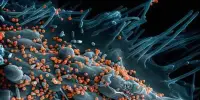Melanoma is a type of skin cancer that can spread quickly to other parts of the body, and immunotherapy is a promising treatment option that uses the body’s immune system to fight cancer cells. A recent study may have found that a combination of diet and probiotics could help enhance the effectiveness of melanoma immunotherapy.
According to a new study led by University of Pittsburgh researchers, probiotic bacteria travel from the gut and establish in tumors, where they directly stimulate immune cells, making cancer immunotherapy more effective.
The study, published today in Cell, found that Lactobacillus reuteri stimulates cancer-killing T cells by secreting a compound known as indole-3-aldehyde, or I3A. When the researchers fed mice a diet high in the amino acid tryptophan, which bacteria convert to I3A, immunotherapy drugs had a greater effect on reducing tumor size and extending survival. The findings pave the way for clinical trials to see if I3A treatments or combining probiotics and diet could improve outcomes in melanoma patients receiving immunotherapy.
“We knew that gut microbes influence immunotherapy response, but there were still big questions about how they do this and whether they act from the gut or if they have to be at the tumor site,” said senior author Marlies Meisel, Ph.D., assistant professor in the Department of Immunology at Pitt’s School of Medicine and member of the Cancer Immunology and Immunotherapy Program (CIIP) at UPMC Hillman Cancer Center. “Our study is the first to show that orally administered bacteria increase the efficacy of cancer immunotherapy by moving to tumors outside of the gut where they directly impact immune cells in the tumor.”
Our study is the first to show that orally administered bacteria increase efficacy of cancer immunotherapy by moving to tumors outside of the gut where they directly impact immune cells in the tumor.
Marlies Meisel
Immunotherapy, which helps the body’s immune system recognize and kill cancer cells, is effective for some patients but not for others due to the gut microbiome. Several recent studies have also discovered a link between probiotic supplements and immunotherapy response in patients with melanoma.
To find out more, Meisel and her colleagues fed germ-free mice with melanoma L. reuteri, a bacterium commonly found in commercially available probiotics. They demonstrated that bacteria moved from the gut to tumors, where they established and remained for a long time.
Compared to control mice that did not receive bacteria, those given L. reuteri had greater quantities of more potent CD8, or “killer,” T cells at the tumor site, the tumors shrank more, and the mice lived longer. And the effects of L. reuteri weren’t limited to melanoma. In mouse models of adenocarcinoma, fibrosarcoma and breast cancer, the bacterium similarly moved to tumors beyond the gut and suppressed cancer growth.

Further investigation revealed that L. reuteri stimulates immunity in tumors by producing I3A, which activates a receptor in CD8 cells. Despite the fact that the receptor is found in almost every cell in the body, I3A acts specifically on CD8 cells to boost their cancer-killing abilities. The bacteria no longer induced anti-tumor immunity when the researchers removed the receptor from these cells, indicating that the effect is dependent on this receptor in CD8 T cells. They demonstrated that I3A is required for the bacterium’s effect on enhancing anti-tumor immunity and tumor suppression using a genetically modified strain of L. reuteri that cannot produce it.
“While the microbiome of tumors beyond the gut, including melanoma, had been described, the concept that tumor microbes play an active role in mediating cancer immunotherapy efficacy had not been demonstrated,” said Meisel. “So, we were surprised to find that I3A released by L. reuteri within the tumor enhanced immunotherapy response whereas the presence of L. reuteri in the gut was insufficient to have an anti-tumor effect.”
To see whether I3A could play a role in human response to immunotherapy, Meisel teamed up with Diwakar Davar, M.D., assistant professor of medicine at Pitt and member of the CIIP, and Hassane Zarour, M.D., professor of medicine at Pitt and co-leader of the CIIP. Previously, they found that modifying gut bacteria via fecal transplants improved immunotherapy response in melanoma patients.
Analyzing blood samples from melanoma patients undergoing immune checkpoint inhibitor treatment, the researchers found that patients who responded well to immunotherapy had elevated I3A levels. Higher levels of I3A before treatment were also associated with a better chance of survival.
“In the future, based on these findings, it may be possible to use I3A levels as a biomarker to predict which patients are likely to respond to immunotherapy,” Meisel said. “Another direction I’m excited about is developing clinical trials to see if combining I3A with immunotherapy can improve patient outcomes.”
L. reuteri needs tryptophan, an amino acid found in foods like chicken, soybeans, oatmeal, nuts, and seeds, to produce I3A. Tumors grew more slowly in mice fed a tryptophan-rich diet, and the mice lived longer than control mice fed an otherwise identical diet low in tryptophan. A tryptophan-rich diet also enhanced the effect of immunotherapy on tumor shrinkage.
More research, including well-controlled clinical trials, is needed, according to Meisel, to determine whether a tryptophan-rich diet can influence outcomes in cancer patients.
“This paper should not be interpreted as a recommendation, but rather as a starting point for future research into how diet affects immunity and cancer outcomes,” she said. “My lab is curious about whether holistic approaches, such as dietary or lifestyle changes, can improve the efficacy of immunotherapy and other cancer treatments.” I believe it is empowering for patients to be able to make these changes themselves – after careful clinical consideration, of course – and have some control over their treatment journey, rather than being completely at the mercy of the health care system.”















